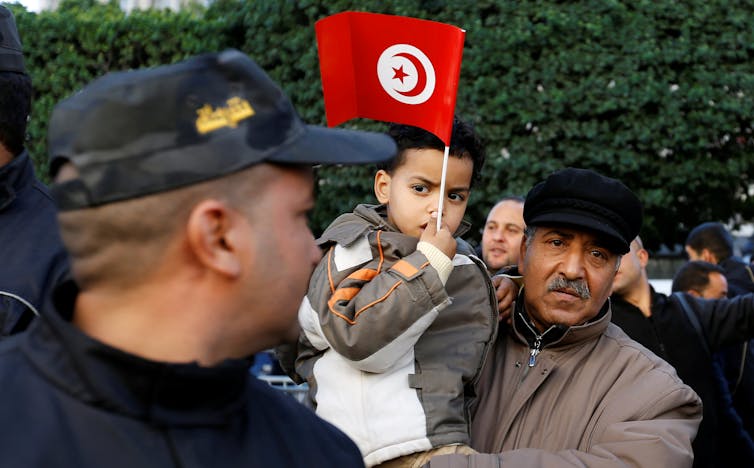
There is something about January in Tunisia. In 1984, the famous bread riots, which almost brought down the regime of Habib Bourguiba, happened in January. January 2011 saw the success of the Jasmine Revolution that brought to an end the 22-year-long dictatorship Zine El Abidine Ben Ali.
And Tunisians are at it again this January. Thousands have been demonstrating on the streets of Tunis and other cities. There have been hundreds of arrests and one person has died. This has led some observers, like the International Crisis Group, to ask whether Tunisians want to roll back the gains of their fledgling democracy.
In their latest report , the non-governmental organisation which is committed to preventing and resolving deadly conflict, warned that there was a real risk of “political tensions and a nostalgia for a strong, centralised government”, in Tunisia with the possibility of a return to the pre-revolution autocratic form of governance.
At first glance, the protests seem to be about higher taxes, and a rising cost of living. On Monday January 3, a movement calling itself Fech Testannew (‘what are we waiting for’) started a protest to challenge austerity measures introduced in the latest budget. The measures included increased taxes on cars, Internet usage and phone calls among others.
The new budget has dented the government’s popularity in the eyes of the people. It authorised the budget because it needed to implement austerity measures to meet conditions attached to a loan it’s secured from the International Monetary Fund. But while Tunisians are rightly concerned about the affordability of basic goods, they are also frustrated with the lack of progress in the government’s broader agenda, such as job creation, tackling regional inequality and corruption.
Root causes of current protests
The situation is much more complicated and the reasons for the tensions are many. Key among them are the challenges of post revolutionary situations in which citizens find that it’s more difficult than they thought to dislodge entrenched political interests.
Furthermore, the progress that has been made in establishing democratic institutions has been stalled by a fractious political party landscape. This is despite efforts by the leadership of the two main political parties – the secular Nidaa Tounes and Islamist Ennahdah – to work together, while incorporating key figures from the Ben Ali regime. This has provided some political stability but tensions remain. In particular the schism between Islamist and secular forces still runs deep.
Tunisians are also concerned about the delay in establishing critical democratic institutions such as the Constitutional Court. And the postponement of local government elections that were set to introduce a decentralised system of governance. This has deepened the rift between the leadership and the electorate.
The situation has been further complicated by extremist secular elements within the opposition party Popular Front. It has attempted to use the protests to try and force Ennahdah out of the coalition government. This has led some international media commentators to warn that leading political forces risk “playing with fire in the dry tinder of inequalities and graft” that are still pervasive in Tunisia.
The situation in the country has also been exacerbated by the slow pace of economic reform and the government’s slow delivery on jobs and investment.
Youth unemployment, which is a key indicator of a country’s economic prospects, stands at around 35%. To make matters worse the public sector, which accounts for a fifth of all workers, is no longer hiring. This has left many young Tunisians struggling to find employment. More than 60% of working men and 83% of working women are part of the country’s growing informal economy.
The tax hikes seem to have been the last straw. The proposals in the budget appear to have been made to placate the International Monetary Fund, which has given Tunisia a $2.9bn loan on condition that it would carries out financial reforms.
Next steps
The Tunisian government needs to progress along three, carefully balanced fronts to deliver on the high expectations of Tunisians.
First, it needs to fulfil the promises of the 2014 Constitution by entrenching democratic rule and establishing essential institutions such as the Constitutional Court. It must also ensure that the local and regional elections scheduled for May 2018 take place.
Secondly, it must tackle widespread corruption. To do this it must confront the corrupt Ben Ali elites that are forcing their way back into the new order, including occupying senior positions in government.
Finally, it needs to build state capacity to enforce reform. Reform is necessary for the stability and security that is vital to attract international investment, and to rebuild the tourism industry, which has suffered as a result of terrorist attacks.
This will be a tall order for Tunisia. What makes it even more challenging is the elections time line that will roll out over the next 18 months or so, starting with the local elections, followed by parliamentary and presidential elections.
![]() During this critical period, Tunisia’s political leadership needs to do everything it can to keep the peace. The considerable goodwill shown by the international community so far also needs to translate into demonstrable support. Lenders like the IMF need to give the Tunisian government more room to manoeuvre.
During this critical period, Tunisia’s political leadership needs to do everything it can to keep the peace. The considerable goodwill shown by the international community so far also needs to translate into demonstrable support. Lenders like the IMF need to give the Tunisian government more room to manoeuvre.
Adnan Saif, PhD Student, International Development Department, University of Birmingham


